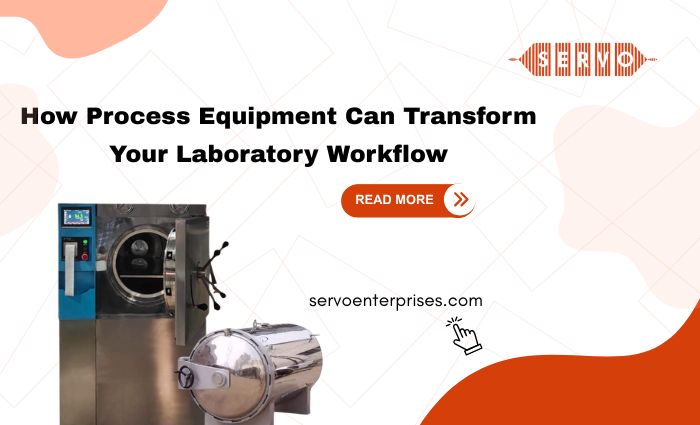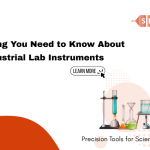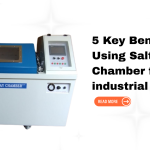Introduction
In today’s rapidly evolving industrial and scientific world, accuracy and efficiency are critical to success. Yet, many laboratories, whether in research, quality testing, or academics, are still depending heavily on manual processes and outdated tools. This dependence slows progress, increases errors, and drives up operational costs.
This is where process equipment plays an essential role. Modern laboratories that adopt the right equipment can bring a massive change in their workflows, moving from time-consuming manual tasks to streamlined, reliable, and scalable operations.
What is Process Equipment?
Process equipment includes specialized laboratory machines like salt spray chambers, environmental chambers, and ovens that provide controlled testing environments. Unlike conventional tools dependent on manual effort, these advanced systems bring automation, precision, and consistency into laboratory workflows.
They streamline operations, reduce errors, and ensure repeatable, reliable results essential for research, testing, and industrial applications.
Why is Process Equipment Important in Labs?
Unlike conventional equipment that depends on manual effort, Laboratory process equipment brings automation, precision, and consistency to laboratory workflows.
This is important because manual work often takes too much time, leads to measurement errors, and makes it harder to scale experiments. Old or disorganized equipment can also create delays, increase costs, and compromise data reliability.
How the Right Process Equipment Solves These Problems?
The right process equipment directly addresses these challenges by optimizing laboratory workflow. Let’s break it down:
1. Saving Time Through Automation
Manual tasks such as preparing samples, monitoring test conditions, and recording results can consume hours. Modern laboratory chambers and ovens automate these functions, allowing scientists and technicians to focus on analysis and innovation instead of repetitive chores.
For example, a salt spray chamber automates corrosion testing by maintaining controlled humidity and salt concentration, eliminating the need for constant monitoring.
2. Reducing Errors and Improving Accuracy
Errors in measurement or inconsistent conditions can compromise research. Laboratory equipment with advanced controls ensures that variables like temperature, humidity, or pressure remain precise throughout experiments. This leads to reproducible and trustworthy results.
3. Organizing Laboratory Workflow
Old and disorganized setups slow down progress. Upgrading to modern lab instruments helps create a proper and structured workflow, where processes are clearly defined and easy to execute.
This well organized work-flow eliminates unnecessary delays.
4. Lowering Operational Costs
While investing in new equipment might feel expensive, it pays off quickly. Automated systems reduce labor costs, minimize the risk of failed tests, and prevent expensive rework.
In the long run, better process equipment makes laboratories cost-efficient.
5. Scaling Research and Testing Efforts
If your lab is expanding, scalability becomes essential. Equipment such as large-capacity ovens or multi-sample testing chambers make it possible to run parallel experiments, enabling growth without compromising data quality.
6. Ensuring Reliable Data
Consistency is the foundation of reliable research. Automated lab instruments provide digital tracking, data logging, and advanced reporting, ensuring that results remain accurate and traceable.
Key Process Equipment Every Modern Laboratory Should Consider
As laboratories face growing demands for precision and efficiency, selecting the right process equipment becomes a strategic decision. Upgrading your lab with advanced laboratory equipment ensures reliable data, optimized testing environments, and long-term cost savings.
The following categories represent some of the most critical instruments for modern laboratory workflows.
1. Oven Equipment
Used for controlled heating, drying, and curing, ensuring uniform temperature distribution for material testing and preparation.
2. Furnace Equipment
Generates high temperatures for processes like heat treatment, melting, sintering, and annealing with precise thermal control.
3. Washing Machine
Automates glassware and instrument cleaning with high-pressure water, ensuring contamination-free, repeatable results.
4.Vacuum Oven
Removes moisture and solvents under reduced pressure, ideal for delicate samples and heat-sensitive materials.
5. Coating Machines
Applies uniform liquid or film coatings using methods like spin, dip, or spray—widely used in R&D, pharma, and electronics.
6. Fermentors
Bioreactors that cultivate microorganisms or cells under controlled conditions, crucial in biotech and pharmaceutical industries.
7. Autoclave
Sterilizes lab equipment with high-pressure steam, eliminating bacteria and spores for aseptic and contamination-free workflows.
Choosing the Right Lab Instrument Supplier
The transformation of a laboratory goes beyond simply buying new equipment, but it requires choosing the right lab instrument supplier.
A reliable partner ensures not just high-quality products, but also consistent performance, timely maintenance, and expert guidance. This combination of equipment and support is what truly drives long-term efficiency and success.
When choosing a supplier, keep these factors in mind:
- Product quality – Check if the supplier’s equipment meets international standards.
- Range of solutions – Look for suppliers that provide a wide range of laboratory equipment suited to your industry.
- After-sales support – Installation, calibration, and maintenance services are critical for long-term performance.
- Customization options – Laboratories often require equipment tailored to specific needs. A supplier offering customization is a strong partner.
- Reputation and expertise – Established suppliers with proven expertise, like Servo Enterprises, bring reliability and trustworthiness to your operations.
Laboratory Workflow Before vs. After Process Equipment
| Aspect | Without Process Equipment | With Process Equipment |
| Time Efficiency | Manual tasks take hours, slowing down progress | Automated systems complete tasks quickly, saving valuable time |
| Accuracy | High chances of human error and inconsistent measurements | Precise control ensures reliable and repeatable results |
| Workflow Organization | Disorganized setups create bottlenecks and delays | Streamlined, structured processes improve overall lab efficiency |
| Cost Management | Increased expenses due to wasted resources and rework | Reduced operational costs through optimized performance |
| Scalability | Difficult to handle higher volumes of testing | Equipment supports large-scale, parallel experiments with ease |
| Data Reliability | Manual tracking leads to incomplete or inaccurate records | Digital monitoring and logging ensure trustworthy, traceable data |
Advantages of Using Process Equipment in Laboratories
Modern laboratories will be useful, more than just automation when they adopt process equipment. These advanced lab equipments are designed to improve productivity, maintain accuracy, and optimize resources. Some of the key advantages include:
- Faster Operations: Automated processes reduce turnaround time and free staff for higher-value tasks.
- Greater Precision: Instruments deliver consistent results, lowering the risk of variation and error.
- Room for Expansion: Labs can handle higher workloads and complex projects with ease.
- Lower Costs: Streamlined workflows and reduced rework translate into long-term savings.
- Trustworthy Results: Digital monitoring ensures every outcome is recorded, repeatable, and verifiable.
By introducing these advantages, laboratories can run smoother, produce more reliable outcomes, and maintain competitiveness in demanding industries.
Final Thoughts
A laboratory’s workflow can either be a source of frustration or a driver of innovation. The difference lies in having the right process equipment. By addressing common pain points like manual errors, wasted time, and high costs, advanced laboratory equipment enables reliable, scalable, and cost-effective research.
In the end, the right investment in process equipment is not just about machines, it is about empowering your laboratory to deliver accurate results, innovate faster, and stay ahead of the competition.
Transform your lab with advanced process equipment. Contact Servo Enterprises now to find the right solution for your workflow.!
Frequently Asked Questions
1. What is process equipment in a laboratory?
Process equipment refers to specialized machines and instruments—such as chambers, ovens, and testing systems; used to streamline laboratory operations, improve accuracy, and ensure reliable results.
2. How does process equipment improve laboratory workflow?
It automates repetitive tasks, reduces errors, saves time, and provides consistent results, making laboratory operations more efficient and cost-effective.
3. Why should I upgrade old laboratory equipment?
Outdated equipment can cause delays, errors, and higher costs. Modern lab instruments improve accuracy, reliability, and scalability for research and testing.
4. What should I look for in a lab instrument supplier?
Choose a supplier that offers quality-certified products, a wide range of laboratory equipment, customization options, and reliable after-sales support.
5. Why choose Servo Enterprises for laboratory equipment?
Servo Enterprises is a trusted lab instrument supplier known for high-quality process equipment, expert guidance, and dedicated support that helps laboratories achieve efficiency and innovation.



